

CODE UPDATE

Update #17 Five-Pin or Five-Disk Cylinder Type Locks (2.12.7.2.2)
Have you ever found yourself wondering, "What exactly is a 'cylinder-type lock having not less than a five-pin or five-disk combination?'" Yeah...I've wondered the same thing.
Sections of the code requiring five-pin or five-disk combination locks:
2.12.7.2.2 - Hoistway access switches
2.14.2.6 - Panels for access to the car or hoistway transparent enclosures for cleaning purposes
5.3.1.18.3 - Private residence elevators - operation of an elevator exterior to the residence
5.4.15.1 - Private residence inclined elevators - operation on the car and at the landings
5.5.1.25.2 - Power sidewalk elevators - operation through the opening in the sidewalk
5.6.1.25.2 - Rooftop elevators - operation to the roof level
6.1.6.2.1 - Escalators - starting switches
6.2.6.2.1 - Moving walks - starting switches
8.4.4.1.1 - Car top emergency exit cover locks on elevators in seismic risk zone 2 or greater
Not very many locations considering how many keyed devices we encounter on a daily basis.
![]()
So what do some of these five-pin and five-disk locks look like? After searching the internet for images I might "borrow", I have assembled the following assortment of lock views and descriptions for your enjoyment.
![]()
The first image depicts a five-pin tumbler lock with the key removed and inserted. With the key removed the 5 pin stacks are not arranged properly to allow the plug to rotate within the shell and unlock the device. The pins are crossing the shear line and prevent the rotation. With the key inserted the pins are rearranged out of the shear line which then allows the plug to rotate within the shell. Most locks encounter in the vertical transportation trade are designed using this basic principle of moving pins or disks (wafers) into the correct position to allow rotation.

Five-Pin Tumbler - Key Removed and Inserted
![]()
The next image depicts a six-disk or six-wafer tumbler. The principle of operation is the same as with the five-pin tumbler. When the key is inserted the disks (wafers) are positioned properly to allow the plug to rotate within the shell.

Example of a Six-Disk Tumbler Lock
![]()
Remember, we need a minimum five-disk combination lock. The following image gives you an idea of how a four-disk tumbler operates.
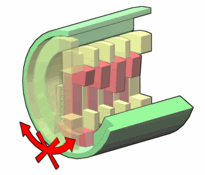
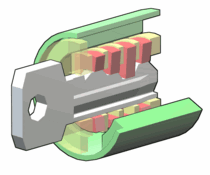
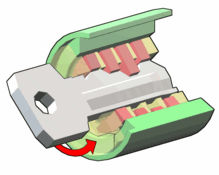
Operation of a Four-Disk Tumbler Lock
![]()
The last 2 images are of a tubular or barrel lock. The tubular key is arranged with grooves cut into the outside circumference of the key blade. The grooves will position the pins out of the shear line allowing the plug to rotate freely in the shell.
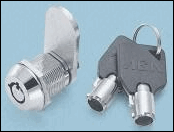
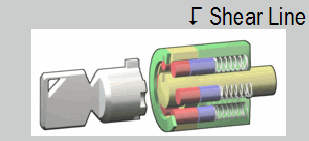
Tubular (Barrel) Lock Operation
![]()
By the way - for some reason the word used to describe the "wafer" type lock is "disk" in all areas of the code except 2.14.2.6(b) where it is "disc"...just in case you are doing a "find..." search on your computer. (So search for "five-disk" as well as "five-disc.")
Also, when I did a search for "five-pin" in my A17.1-2000 PDF file it did not indicate a listing for escalator, nor moving walk starting switches because in both cases the requirement is printed like this:
"cylinder-type lock having not less than a five-
pin or five-disk combination; and"
The line of type ended with "five-" so apparently the "find..." feature did not "see" it. So here's how I do searches envolving hyphenated words like "five-pin." I do a search for "five-pin" and a search for "five-" just in case the line of type ends with the hyphen. Now...don't get locked out!
![]()
![]()
![]()
 E-mail Bob Desnoyers with your lock comments
E-mail Bob Desnoyers with your lock comments 
Welcome/Contact ![]() Résumé
Résumé ![]() Elevator Utilities
Elevator Utilities ![]() Hydraulic Utilities
Hydraulic Utilities
Electric Utilities ![]() Odds & Ends
Odds & Ends ![]() Code Updates
Code Updates ![]() Testimonials
Testimonials
